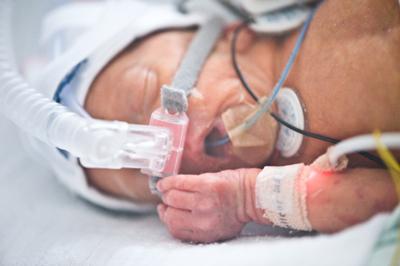Southampton healthcare scientists and engineers unite to tackle chronic skin damage

An interdisciplinary team of researchers from the University of Southampton is pioneering new methods that could change the lives of people living with the long-lasting effects of pressure ulcers and scarring.
Billions of pounds are ploughed into treating problems created by life-supporting and essential devices every year. There is a delicate juxtaposition between hospital devices supporting life but also causing chronic skin damage and scarring.
Health Sciences and Engineering researchers at Southampton are addressing the issue through optimising device design and creating intelligent monitoring to promote patient self-management.
Scientists in the Skin Health Group have partnered with leading experts in the School of Engineering including Professor Liudi Jiang and Dr Alex Dickinson.
Dr Peter Worsley, Associate Professor within Health Sciences, says: “Pressure ulcers have traditionally been associated with people who are relatively immobile, but there is also a problem with skin damage resulting from using medical devices.
“Over one third of hospital-acquired pressure ulcers are caused by devices such as ventilation masks, support collars and prosthetics – anything that touches the skin. These devices are mostly generic in design and use stiff, non-breathable material that can be detrimental to skin health.”
The interdisciplinary partnership is working a number of projects addressing skin health, for example with individuals using prosthetic and orthotics.
Dr Dickinson, of the Bioengineering Science Research Group, says: “We are lucky to have a close relationship with Health Sciences. Our biomechanical modelling and simulation tools are clever but useless if they aren’t designed with clinical issues in mind, and trained with clinical data.
“Peter’s unique clinical and bioengineering experience is key to this multidisciplinary collaboration, and means our students and researchers have exposure to the full range of stakeholders in the care pathway, enhancing their experience, and ensuring our work is valuable to patients.”
Among the research’s outputs, entrepreneurial engineer Dr Joshua Steer has founded Radii Devices from the Bioengineering Science Research Group. He was awarded a Royal Academic Enterprise Fellowship to continue the research and commercialise it through the spin-out which currently employs six staff.
Radii Devices tackles the issue of discomfort and scarring caused by external medical devices such as prosthetics. The World Health Organisation estimates there are about 40 million people who require a prosthetic limb – a figure that is expected to grow due to diabetes, which is on the rise, being a leading cause of amputation.
Dr Steer says: “Our technology supports designers of external medical devices with artificial intelligence to analyse optimal device fit across the population, and biomechanical modelling to predict potential areas of pain. By bringing data and simulation into the design of these devices, our aim is to reduce the number of fittings required and increase comfort for patients.
“Whilst the technology was originally developed for prosthetics, collaboration with the Skin Health Group has already led to implementation of new applications of our technology in other devices, such as respiratory masks.”
Read the full article in the latest edition of Re:action, the University’s research and enterprise magazine.